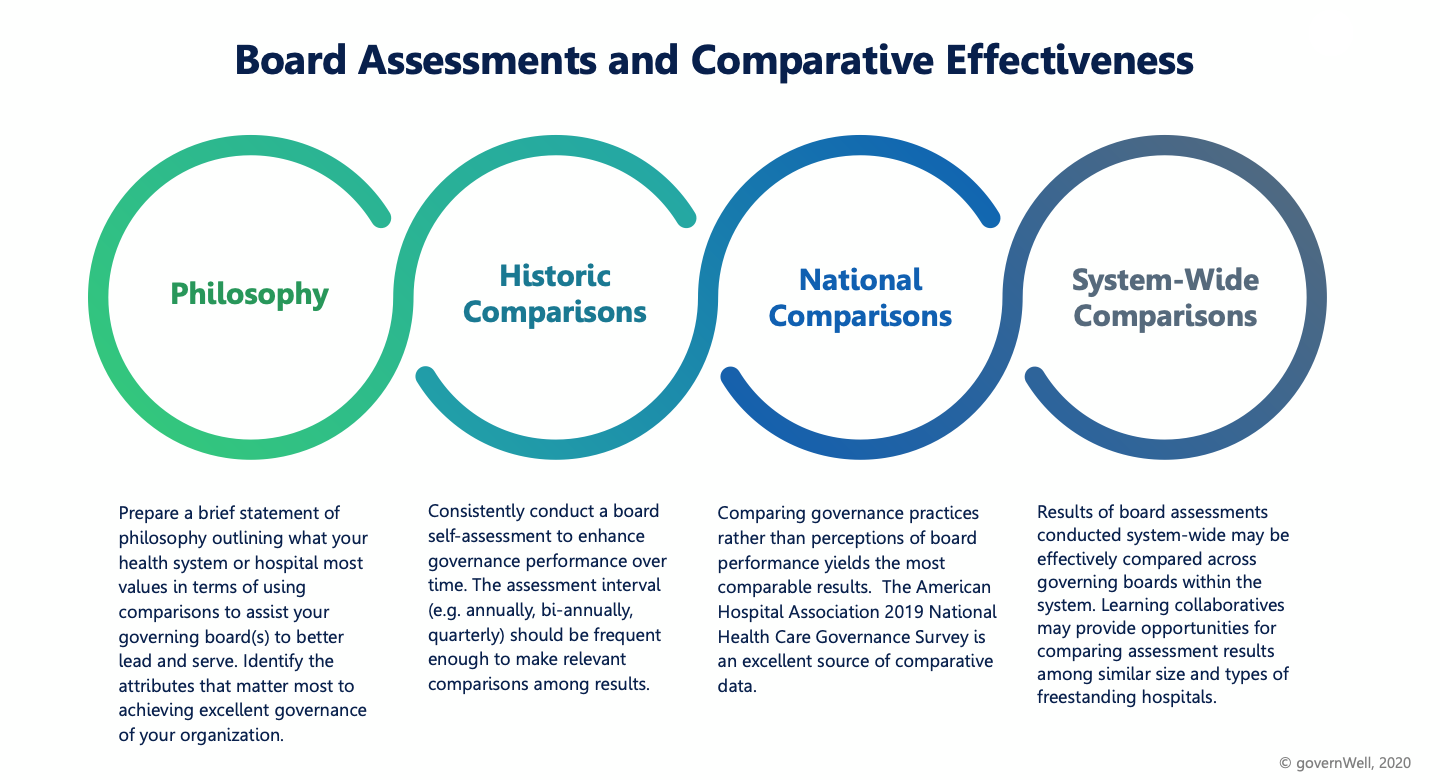
Board Evaluation
Strengthening Governance Through Self-Assessments
Using a consensus-based framework for board success
By Barbara Lorsbach
Boards today face a variety of significant leadership challenges, including responding to the impact of COVID-19, social unrest, the acceleration of disruptor innovations, economic downturns and other uncertainties in health care. These forces hold substantial implications and remarkable challenges for hospital and health system governance.
Recognizing new and different opportunities, guiding strategy, overseeing organizational performance and ensuring achievement are key responsibilities of a high-performing board. Trustees must be nimble, astute and highly competent in carrying out their responsibilities. A well-developed board assessment helps hone those abilities and prepares board members to lead effectively.
Ensuring Board Effectiveness in Turbulent Times
Boards that govern effectively in crisis and turbulent times do not become excellent by chance. They build excellence by purposefully practicing key leadership habits that work together synergistically to ensure long-term leadership effectiveness. One of the key habits of high-performing boards is to ensure their self-assessment is conducted regularly to prepare them to lead into the future.
A board self-assessment is an organized evaluation of board members’ viewpoints about all aspects of board performance in fulfilling governance responsibilities. Successful assessments enable boards to identify governance strengths as well as “governance gaps” or areas in which the board has the greatest potential for improvement. The assessment process identifies these gaps and facilitates the development and implementation of initiatives and strategies to improve leadership performance.
Using a Board Self-Assessment to Improve Effectiveness
A successful board self-assessment engages the board in a wide-ranging evaluation of its overall leadership performance. At the same time, it provides trustees with an opportunity to rate their personal performance as vital contributing members of the board. An excellent board assessment process will achieve several key outcomes:
- Define the board’s most critical governance success factors;
- Secure anonymous, broad-based and insightful trustee input on the critical fundamentals of successful governing leadership;
- Create an opportunity to address major issues and ideas in a collaborative manner;
- Clearly demonstrate where the board is in agreement, or has differing perspectives, on leadership fundamentals and issues;
- Assess the degree of trustees’ common understanding, expectations and direction for the board;
- Identify opportunities for meaningful leadership improvement; and
- Help management better understand and respond to the board’s leadership education and development needs.
Many health care boards conduct an assessment prior to their annual retreat, during which they have ample time to discuss the assessment results and explore ways to improve leadership performance. Due to the COVID-19 pandemic, assessment results may need to be discussed in a virtual board meeting rather than in person. Regardless of the timing and venue, conducting a board self-assessment and discussing the implications of the findings is a leading practice of excellent boards.
Conducting a Board Self-Assessment
The board assessment should include specific, precise and well-articulated criteria that relate to the health system and/or hospital’s unique board and leadership challenges. Areas addressed in many assessments include overall board performance in several areas of leadership accountability, identification of issues and priorities facing the board, assessment of individual trustee performance and assessment of the board chair and board committees.
The Challenge of Meaningful Comparisons
Frequently, boards want to compare their self-assessment results to those of other health systems and hospitals. However, it can be challenging to find appropriate and meaningful comparisons. Because of notable differences among health system and hospital structures, breadth, size, scope of authority and types of services provided, some databases traditionally used for benchmarking do not yield “apples to apples” comparisons. Getting the needed structural, organizational and cultural context to accurately evaluate the data against a specific health system’s or hospital’s board self-assessment results is rarely possible. Without relevant and truly comparable data, the resulting information may not provide the insights needed to develop effective governance performance.

Boards may be better served by thinking in terms of comparative effectiveness rather than benchmarking. By developing a philosophy for comparing performance and drawing upon the most meaningful data, a board can learn from other health systems’ and hospitals’ governance practices and avoid the pitfalls of inappropriate comparisons.
The American Hospital Association 2019 National Health Care Governance Survey Report is an example of a meaningful and compelling source of data for comparing governance practices. With over 1,300 health systems and hospitals contributing through survey responses, the AHA report paints a picture of current board structures and practices and segments the data to show general similarities and differences among boards of health care systems, boards of hospitals within systems and boards of freestanding hospitals. As noted in the report’s executive summary, the data should not be viewed as benchmarks. AHA encourages board members to use the report’s results as a conversation starter to gain insights into key opportunities that will further enhance their own board’s performance.
Putting Assessment Results to Work
Conducting the board assessment is just one step in improving governance leadership performance. The key to the success of the full process is not simply the measurement of trustee viewpoints but instead the action that is taken because of a careful examination of those viewpoints. Board assessment results should be a catalyst to engage trustees in a wide-ranging discussion of findings that highlight performance gaps and areas where trustees lack consensus about the board’s performance.
Through an effective, well-developed board self-assessment process, growth opportunities can be realized, education can be pinpointed to unique governance needs, recruitment of new trustees can be undertaken with increased confidence, and strategy development can be conducted within a consensus-based framework — with everybody working together for success.
Barbara Lorsbach, FACHE, (blorsbach@governwell.net) is president of governWell, based in Oak Brook, Illinois.
Please note that the views of authors do not always reflect the views of the AHA.
